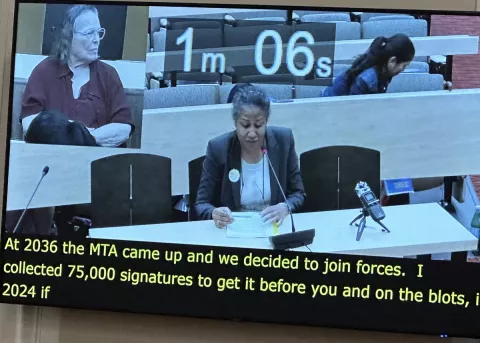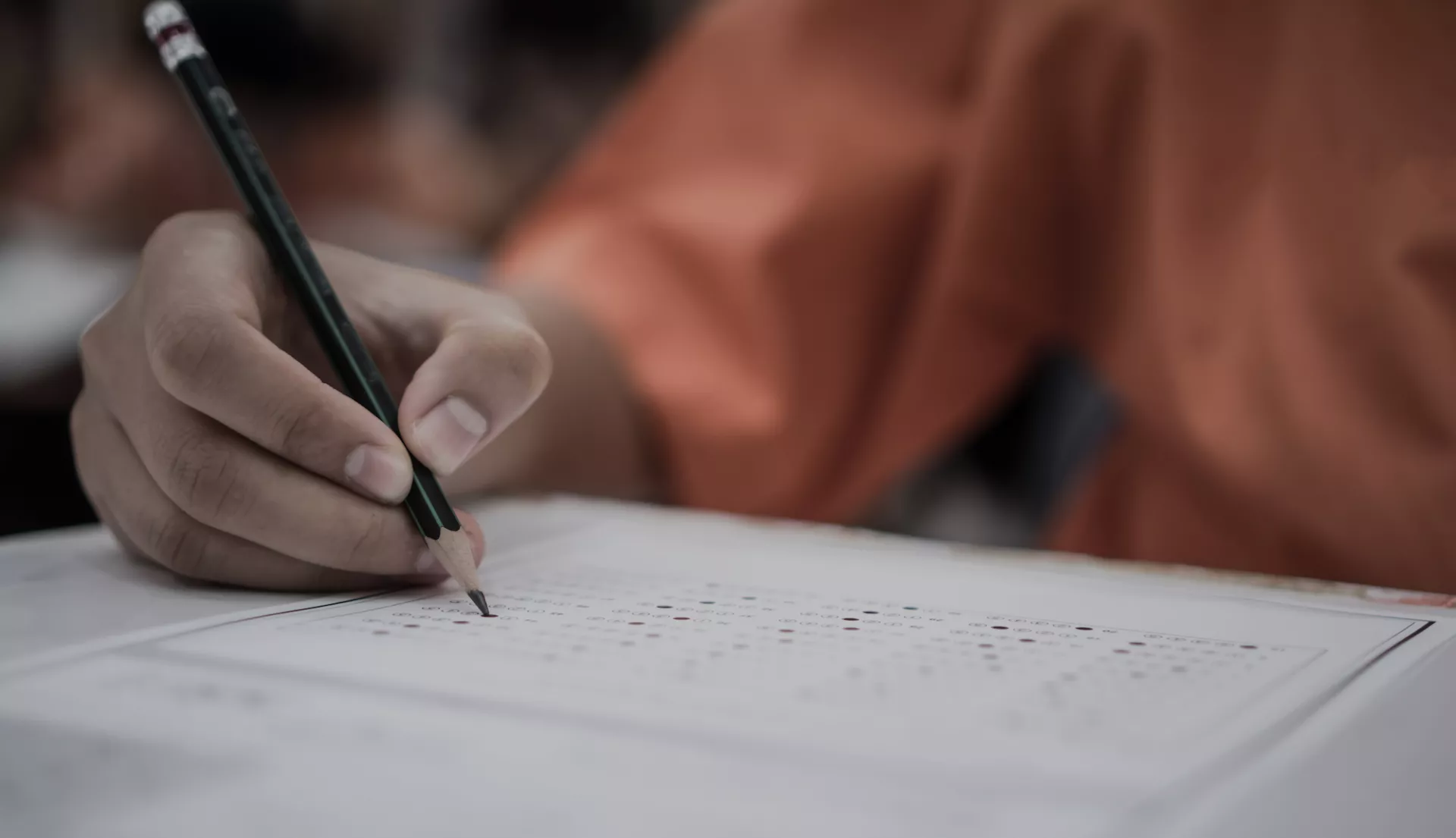Key Takeaways
- In Massachusetts, voters rejected the state’s harmful reliance on a high-stakes graduation exam.
- The students who most often fail—and can’t get a diploma—have been English learners and students with disabilities.
- Very few states still use graduation tests, which are a legacy of the No Child Left Behind era. Most rely on coursework and credit completion; many are thinking about the skills and competencies graduates need.
[Editor's note: This story was updated Nov. 6.]
When Massachusetts special education teacher Kelsey Romano thinks about the MCAS—the high-stakes standardized test that her high school students must pass to graduate—she thinks about the student who changed her flat tire.
He’s helpful, kind, and determined, meeting academic challenges through hard work. A student-leader in Monument Mountain High School’s horticulture program and on its athletic fields, he has earned passing grades in his classes and grade-level proficiency in reading and math, despite a learning disability.

His future is bright.
Or it was—until he recently failed the biology section of the MCAS. Now, “he feels terrible about himself,” says Romano. “Even knowing his reading level and the incredible work he has done around school, it’s really caused him to question his future… What is most obvious to me about this test is the harm done to students’ confidence and their ability to have a successful future—because of a test!”
On Tuesday, Nov. 5, Massachusetts voters decided to end the use of MCAS as a requirement for graduation, by a vote of 60 to 40 percent. Only a handful of towns voted to keep it, while hundreds of towns said good riddance.
"In passing Question 2, Massachusetts voters have proclaimed that they are ready to let teachers teach, and students learn, without the onerous effects of a high-stakes standardized test undermining the mission of public education: to prepare all students for future success as citizens, workers and creative, happy adults," said Massachusetts Teachers Association (MTA) President Max Page and Vice President Deb McCarthy, in a joint statement on November 6.
Their decision is part of a national conversation over what it should mean for students to graduate and be prepared for life after high school. Can one high-stakes test show everything students have learned from K to 12? Especially students with disabilities?
Or is past learning and future readiness better measured by the educators who wrote the state’s academic standards and continuously assess whether their students are meeting them?
The answer is clear to educators. “We want to educate the whole child. We want to prepare them for the 21st century,” says McCarthy, about what she and her colleagues are doing for Massachusetts students. “We do not see our students as widgets. We do not see them as a one-time metric.”
And, she adds, parents agree.
Ditching the Exit Exam: A Growing Trend
A growing list of states have ditched their make-or-break graduation tests, notes Harry Feder, executive director of FairTest. Historically, this type of test dates back to early-Bush era, or “No Child Left Behind” days of education.
“The trend nationally is to do away with high-stakes exit exams for graduation and to [instead] use other ways of determining whether or not kids have the knowledge and skills that warrant giving them a diploma,” says Feder.
The most common state requirement for graduation, used in 47 states (sometimes in combination with tests), is for students to pass a certain number of courses and gather a required number of credits. In 31 states, this is “the sole substantive requirement for graduation,” according to FairTest. Ten of those states do require students to pass a civics exam before graduating.
With the victory in Massachusetts, only seven states still require students to pass a high-stakes exam to get a state-issued diploma, down from a high of 27 in the mid-2000s. They are Florida, Louisiana, Ohio, New Jersey, New York, Texas, and Virginia.
However, in New York, at the recommendation of a “blue ribbon commission,” the State Department of Education announced in June that it is removing Regents exams from graduation requirements. Likely beginning with the class of 2026, New York’s graduating students will demonstrate their learning in other ways, such as capstone projects. And, in New Jersey, a bill to end that state’s graduation exam passed the state Assembly last year, by a vote of 64-9, but stalled in the state Senate. The legislation has the support of the New Jersey Education Association.
The Tragic Cost of Exit Exams
Something that Massachusetts educators want people to understand: Getting rid of the MCAS as a graduation exam doesn’t mean students won’t have to meet the state’s “gold standards.” Bay State educators take great pride in their academic standards, which they developed in the 90s.
“They’re called the ‘gold standards’ throughout the country,” says MTA’s McCarthy. “People look up to us because of the excellent frameworks we have developed!”

It also doesn’t mean getting rid of MCAS. Students, from third grade on up, will still take it, as required by federal law, and its data will still be useful to school districts and communities.
What will go away, hopefully, is the harm done to students and teachers by the use of this test as a make-or-break graduation exam. Typically, about 700 Massachusetts 12th-graders annually—students who have fulfilled all other academic requirements—do not get a diploma because of the MCAS.
Among those kids, 85 percent are English learners or students with disabilities, says McCarthy, who cites state Department of Education (DOE) research. Educators suspect many of the remaining 15 percent are kids with anxiety. “We’re harming and targeting the populations that need the most support,” says Romano.
And it’s not just those 700. Thousands more Massachusetts students simply drop out after failing the tenth-grade test—and, last year, 16,000 students failed.
It’s a fact that high school exit exams increase dropout rates, especially among students from low-income families and students of color, research shows. In one study of 11,000 school districts, over 10 years, researchers found that dropout rates for 12th graders were 23 percent higher in states that required students to pass exit exams without offering alternate pathways to a diploma.
Meanwhile, the test doesn’t come close to measuring what students know, says reading specialist Sarah Woodard, a 26-year Easthampton, Mass., teacher who spent her first 12 years as a special ed teacher. “My students may be brilliant—but this test doesn’t show it,” says Woodard.
Kelsey Romano: On Better Ways to Assess Students
Elapsed time: 0:00
Total time: 0:00Teaching to the Test
Consider Shelley Scruggs’ son. A 16-year-old student at Minute Man Technical Institute in Lexington, Mass., Shawn has ADHD and isn’t great at test-taking, says his mother. He’s very good with his hands however, and has an excellent understanding of algebra and geometry, which will pay off in his future career as a plumber.
But he failed the English section of the MCAS by a single point last year. “If a kid goes to school every day, passes all of their classes and earns all the required classes, he should be able to graduate,” says Scruggs. Kids in private schools graduate without passing the MCAS, she points out.

Just two years ago, Shawn’s English score was actually considered a passing score, but state officials raised the bar in 2023. “For some reason, the DOE thought it’d be a great idea to increase the cutoff score—to make it harder—before we’ve come through the after-effects of the pandemic,” notes McCarthy.
Now, Minute Man is providing Shawn with extra help so that he can get that one additional point—and the career that he has earned.
“A lot about the MCAS is just learning to take tests,” says Scruggs, a Princeton University graduate and MIT employee, who initiated the ballot question that voters weighed this month.
Indeed, Romano sees her colleagues putting aside the lessons they want to teach students to focus on test-taking skills. “I know some would say that’s helpful… but really it’s about test-taking and memorizing and regurgitating formulas. Like if you don’t know the answer, pick C! It’s just test-taking skills, not real-life skills,” she says.
As a result, the high school curriculum is narrowed. Lessons that spur students’ curiosity, that might be project-based, creative, or focused on the executive functioning skills that kids need, are sacrificed. None of this is great for teachers, either.
“Teachers are demoralized. We’re not burnt out. We’re demoralized,” says McCarthy, “Nobody went into this profession because we wanted to be the keeper of the test score.”
What's Next for Graduation Requirements?
For many months, MTA members and parents worked together to get the message out to their friends and neighbors. It wasn't that hard. “You stand there with a clipboard, and you know, nobody wants to talk to you. And then you say, ‘MCAS,’ and they do a 180,” says Scruggs.
Parents and educators know there are better alternatives. “It’s part of our job to provide a variety of methods for students to show what they know,” says Romano. For some students, it might be an essay. For others, a capstone project or portfolio of work. “Some kids, I’m sure, do really great on standardized tests. That’s awesome, but so many don’t—and we’re leaving them behind,” says Romano.
Many states that have turned away from high-stakes exit exams are considering the “portrait of a graduate,” says Feder. What knowledge, skills, and attributes do students need to be successful?
In Ohio, the state created 12 new “diploma seals,” of which graduating students must earn two. The seals include biliteracy, “industry-recognized credentials,” science, and technology. Meanwhile, the New Mexico Graduation Equity Initiative has turned that state toward in-depth, months-long capstone projects.
“Success in life isn’t about filling in bubbles on a test. It’s about critical thinking, collaboration, and adaptability—skills that are often left behind in a system that prioritizes standardized testing above all else,” notes NEA President Becky Pringle. A better system would look at “a student’s entire body of work,” she adds.
The bottom line? “Graduation shouldn’t be reduced to a single test,” says Feder.
Read the Report
In May 2023, NEA and FairTest convened experts in the area of performance-based assessment to answer important questions about the future of assessment.
Do the Micro-credential
NEA offers a stack of six micro-credentials to help educators create or revise a quality performance assessment, implement it in the classroom, and reflect on the process to inform further instruction.




